
by Ria Olivier | Feb 11, 2022 | Marion Island, Meteorology, Not-Assigned, Oceanography, Research, SA Agulhas II, SANAP Student, Science, Southern Ocean, STEM, sub-Antarctic, Women in Science
In honour of every woman and girl entering the field of science within the Antarctic, sub-Antarctic and Southern Ocean.
Be inspired by the Women in Antarctic, sub-Antarctic and Southern Ocean Science.
Be inspired by the girls taking Marine Sciences as a subject in high school laying the path for their future in science.
Read more about the new SA subject – Marine Sciences: https://bit.ly/3gF9WN7
Anche Louw, Antarctic Legacy of South Africa, 11 February 2022

by Ria Olivier | Dec 24, 2021 | Antarctica, News, Research, SA Agulhas II, SANAE, Southern Ocean
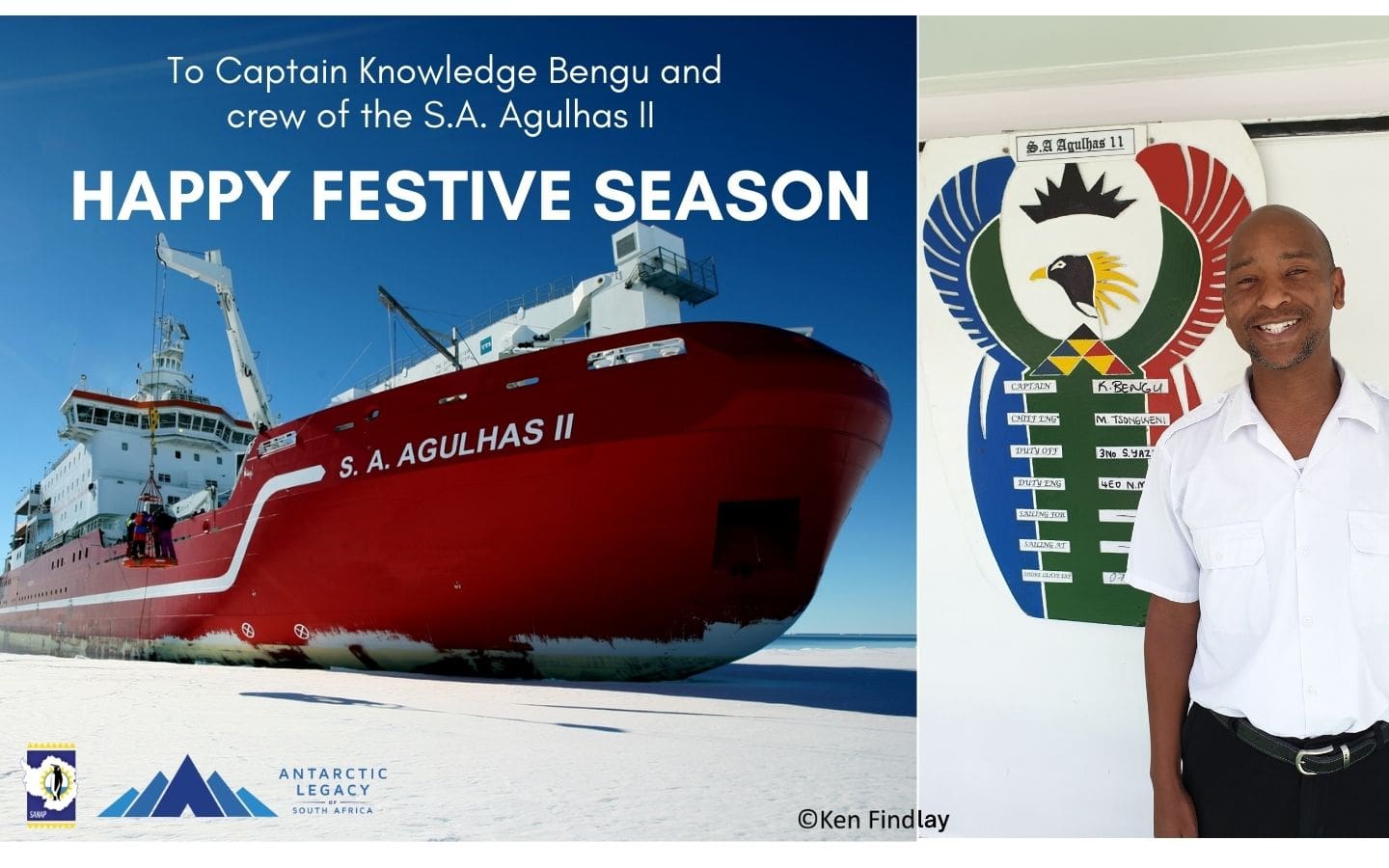 ALSA would like to wish all onboard the research and supply vessel, the S.A. Agulhas II, currently at the Antarctic ice shelf, a happy festive season.
ALSA would like to wish all onboard the research and supply vessel, the S.A. Agulhas II, currently at the Antarctic ice shelf, a happy festive season.
Special thoughts go out to the Captain of the vessel, Captain Knowledge Bengu, and the crew who will be having all hands on deck throughout the festive season. Thank you for supporting all the research activities etc. onboard.
A special message to the AMSOLITES (Captain and Crew) from AMSOL:

Anche Louw, Antarctic Legacy of South Africa, 24 December 2021.

by Ria Olivier | Dec 22, 2021 | Legacy, News, Oceanography, Research, SA Agulhas II, Science, Southern Ocean
Congratulations to all SANAP graduates of 2021. A special congratulations to Dr Mhlangabezi Mdutyana, who just made history by being the first black South African to graduate with a doctorate in observational ocean biogeochemistry.
He is part of the Parallel cycling of nitrogen and iron in the upper Southern Ocean: implications for biological CO2 drawdown and global ocean fertility project led by Principal Investigator, Dr Sarah Fawcett (Department of Oceanography, University of Cape Town).
Read Dr Mdutyana’s inspirational story here. Dr Mdutyana was interviewed by various news channels, see below. Dr Mdutyana is a true inspiration to the future generation of scientists in South Africa.
Anche Louw, Antarctic Legacy of South Africa, 22 December 2021.

by Ria Olivier | Sep 30, 2021 | Antarctica, Data Management, Gough Island, Marion Island, Not-Assigned, Prince Edward Islands, Research, SA Agulhas II, SA Polar Infratsructure, SANAP, Science, Southern Ocean
 South African Polar Research Infrastructure (SAPRI): Launch of the Preparatory Phase
South African Polar Research Infrastructure (SAPRI): Launch of the Preparatory Phase

 The SAPRI team is pleased to inform you that the contractual agreement for the starting of the SAPRI implementation phase is being finalized between the Department of Science and Innovation (DSI) and National Research Foundation of South Africa (NRF). We have now entered the Preparatory Phase of SAPRI’s operationalisation and interim measures are being put in place to ensure progress is made. Until the formal signature of the contract, the SAPRI cannot officially initiate Phase 1, but in the interim the Preparatory Phase will continue the conceptual design of the RI and predispose priority actions with the support of the community.
The SAPRI team is pleased to inform you that the contractual agreement for the starting of the SAPRI implementation phase is being finalized between the Department of Science and Innovation (DSI) and National Research Foundation of South Africa (NRF). We have now entered the Preparatory Phase of SAPRI’s operationalisation and interim measures are being put in place to ensure progress is made. Until the formal signature of the contract, the SAPRI cannot officially initiate Phase 1, but in the interim the Preparatory Phase will continue the conceptual design of the RI and predispose priority actions with the support of the community.

 These achievements would not have been possible without the trust demonstrated by the scientific SANAP community towards the SAPRI team, the contribution and constructive support of the DFFE Oceans & Coasts Branch managing the SANAP logistics, and the commitment to collaborate offered by other institutions that have historically been involved in polar research. This gestation and birth of SAPRI is a major advancement to streamline, consolidate and grow the South African polar sciences, and represent a systemic innovation to maximize the investments of the various governmental institutions involved. The SAPRI will officially start from the advantageous position of being incubated within South African Environmental Observation Network (SAEON), which will fast-track the establishment of the governance and of the consortium agreements.
These achievements would not have been possible without the trust demonstrated by the scientific SANAP community towards the SAPRI team, the contribution and constructive support of the DFFE Oceans & Coasts Branch managing the SANAP logistics, and the commitment to collaborate offered by other institutions that have historically been involved in polar research. This gestation and birth of SAPRI is a major advancement to streamline, consolidate and grow the South African polar sciences, and represent a systemic innovation to maximize the investments of the various governmental institutions involved. The SAPRI will officially start from the advantageous position of being incubated within South African Environmental Observation Network (SAEON), which will fast-track the establishment of the governance and of the consortium agreements.
 The launch of the SAPRI Preparatory Phase was announced via a webinar and a Q&A session to illustrate the main aspects of SAPRI, its organization into integrated facilities, and the first steps of the implementation phase listed in the business plan. To accelerate the implementation phase, it is proposed to initiate an informal Preparatory Phase of SAPRI and to discuss the following actions with the community of stakeholders:
The launch of the SAPRI Preparatory Phase was announced via a webinar and a Q&A session to illustrate the main aspects of SAPRI, its organization into integrated facilities, and the first steps of the implementation phase listed in the business plan. To accelerate the implementation phase, it is proposed to initiate an informal Preparatory Phase of SAPRI and to discuss the following actions with the community of stakeholders:
- Establishment of the User Fora overseeing the requirements of the integrated facilities.
- Implementation of the Task Team for the reorganization of SANAP within the NRF.
- Consultation and discussion on the implementation steps for the Polar Science Transformation Plan.
- Establishment of the DFFE-SAPRI Task Team for assisting with science-related logistics. This will include discussions around the SA Agulhas II dry dock scheduled for November 2021.
 The virtual webinar took place on 29th September 13:00-15:00 and was led by the SAPRI team; Tamaryn Morris, Marcello Vichi, Juliet Hermes, Johannes Pauw.
The virtual webinar took place on 29th September 13:00-15:00 and was led by the SAPRI team; Tamaryn Morris, Marcello Vichi, Juliet Hermes, Johannes Pauw.
- Overview of SAPRI
- Current status, Business Plan priorities, budget requirements and transformation actions
- Q&A
- Preparatory phase
The following links are available to the Antarctic Legacy of South Africa Archive of the webinar recordings and presentations of the South African Polar Research Infrastructure (SAPRI): launch of the Preparatory Phase:
IMPORTANT documents related to and to be read together with SAPRI proposal available on ALSA archive:

by Ria Olivier | Aug 11, 2021 | Antarctica, Research, SA Agulhas II, SANAP, Science
 Industry 4.0 is the digital transformation of global industry. Digital twins pose to disrupt conventional business as they harness real-time data alongside a digitized representation of the state and behaviour of real assets to offer decision support. Sound and vibration research often entails multi-sensor measurements, signal processing and analytics providing an ideal training background to embrace the current innovation climate.
Industry 4.0 is the digital transformation of global industry. Digital twins pose to disrupt conventional business as they harness real-time data alongside a digitized representation of the state and behaviour of real assets to offer decision support. Sound and vibration research often entails multi-sensor measurements, signal processing and analytics providing an ideal training background to embrace the current innovation climate.
 Funding from the South African National Antarctic Programme, has boosted the group’s research to instigate the digital transformation of Africa’s only polar research vessel, the SA Agulhas II, to a “flagship for Vessel 4.0”. The full-scale measurement project – engineering measurements on the ship in operation – kicked off in 2012. SVRG collaborated in an international consortium including the Universities of Aalto and Oulo, Aker Arctic, Det Norske Veritas, Rolls Royce, Wärtsilä and STX Europe. The then, newly commissioned SA Agulhas II was put to the test during two days of ice-breaking operations in the Bay of Bothnia in Finland during ice-trails. Today, the SA Agulhas II is equipped with +200 engineering sensors to measure the ice and waves in the ship’s environment, the bending and twisting of her hull and the wellbeing of passengers.
Funding from the South African National Antarctic Programme, has boosted the group’s research to instigate the digital transformation of Africa’s only polar research vessel, the SA Agulhas II, to a “flagship for Vessel 4.0”. The full-scale measurement project – engineering measurements on the ship in operation – kicked off in 2012. SVRG collaborated in an international consortium including the Universities of Aalto and Oulo, Aker Arctic, Det Norske Veritas, Rolls Royce, Wärtsilä and STX Europe. The then, newly commissioned SA Agulhas II was put to the test during two days of ice-breaking operations in the Bay of Bothnia in Finland during ice-trails. Today, the SA Agulhas II is equipped with +200 engineering sensors to measure the ice and waves in the ship’s environment, the bending and twisting of her hull and the wellbeing of passengers.
Future work aims to leverage the unique advantage of scarce operational full-scale data by transpiring the SA Agulhas II as a digital asset, hinging off Maritime 4.0. The digital transformation of the SA Agulhas II will slave data and models to offer decision support to the ship owner (Department of Environment, Forestry and Fisheries) or Captain for smarter and safer ship ventures. In 2020, Digitization of the ship hull can contribute local climate data on local wave conditions and identify damage to the ship structure. Cyber-physical counterparts of seafarers are also being investigated to deliver crew insights for improved safety, propelling the SA Agulhas II to be an ice-breaker in the ambit of maritime digitization.
 Prof Annie Bekker is Principal Investigator on the “Digital Transformation of S.A. Agulhas II ” project funded by the National Research Foundation and hosted at Stellenbosch University in the Engineering Faculty. Meet the rest of the team of students currently busy with research. Read more on SWG website about the project and their publications and activities.
Prof Annie Bekker is Principal Investigator on the “Digital Transformation of S.A. Agulhas II ” project funded by the National Research Foundation and hosted at Stellenbosch University in the Engineering Faculty. Meet the rest of the team of students currently busy with research. Read more on SWG website about the project and their publications and activities.

by Ria Olivier | Jun 25, 2021 | International Days, Oceanography, Research, SA Agulhas II, Uncategorised

On the 25th June, we celebrate International Day of the Seafarer and recognise the invaluable contribution seafarers make to world trade and the global economy.



The Day of the Seafarer was established in 2010 by a resolution adopted in Manila during a diplomatic conference and has since been driven by the International Maritime Organization (IMO). This year is the 11th anniversary of the Day of the Seafarer and the IMO has outlined the following theme: “Seafarers: at the core of shipping’s future”. The theme “seeks to increase the visibility of seafarers by drawing attention to the invaluable role they play now and will continue to play in the future.”


This day allows for the recognition of the unique and vital roles seafarers play in the global community and the United Nations recognise this as an observance day. The Day of the Seafarer encourages the public and ignites official conversations about seafarers and the need to uphold their well-being, ensure a safe working environment and pay tribute to the great sacrifices made within this industry.


The Antarctic Legacy of South Africa (ALSA) wishes to extend our thanks to the African Marine Solutions: AMSOL seafarers that have served aboard the SA Agulhas I and II over the years. The SA Agulhas II has played host to many Overwintering teams, ushered to the Sub-Antarctic Islands and “home” to SANAP scientists and students for research expeditions. Captains, officers, engineers, deck crew and stewards all play an essential role in the success of a research cruise. Working round the clock to ensure the smooth execution of scientific operations, ensuring a safe working environment and navigating through some of the world’s most treacherous seas.


This is an industry which requires great sacrifice and time away from home, however the AMSOL personnel have a level of professionalism which makes working on board efficient and turns the vessel into a “home away from home” for many scientists.
 A great sense of pride and honour is instilled in all who sail aboard the SA Agulhas II and is seen as privilege to be part of this legacy of exploration. We thank all administrative staff involved with ensuring safe and efficient operations and celebrate all seafarers, without whom our scientific endeavours in the Southern Ocean would not be possible.
A great sense of pride and honour is instilled in all who sail aboard the SA Agulhas II and is seen as privilege to be part of this legacy of exploration. We thank all administrative staff involved with ensuring safe and efficient operations and celebrate all seafarers, without whom our scientific endeavours in the Southern Ocean would not be possible.



Tahlia Henry, Antarctic Legacy of South Africa, 25 June 2021
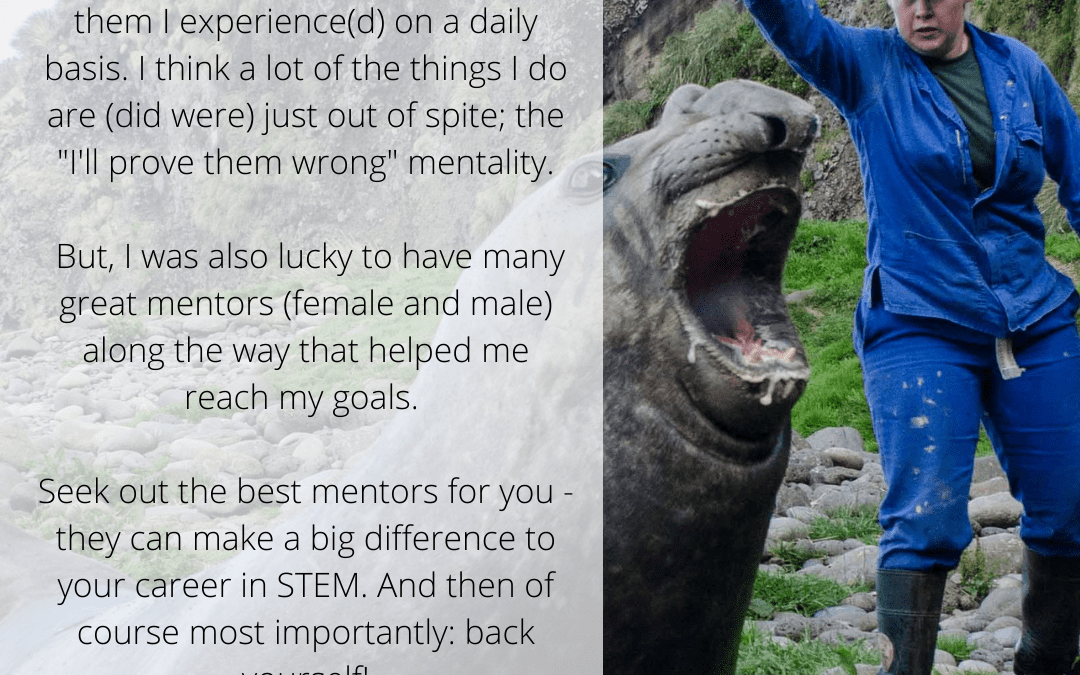


 ALSA would like to wish all onboard the research and supply vessel, the S.A. Agulhas II, currently at the Antarctic ice shelf, a happy festive season.
ALSA would like to wish all onboard the research and supply vessel, the S.A. Agulhas II, currently at the Antarctic ice shelf, a happy festive season.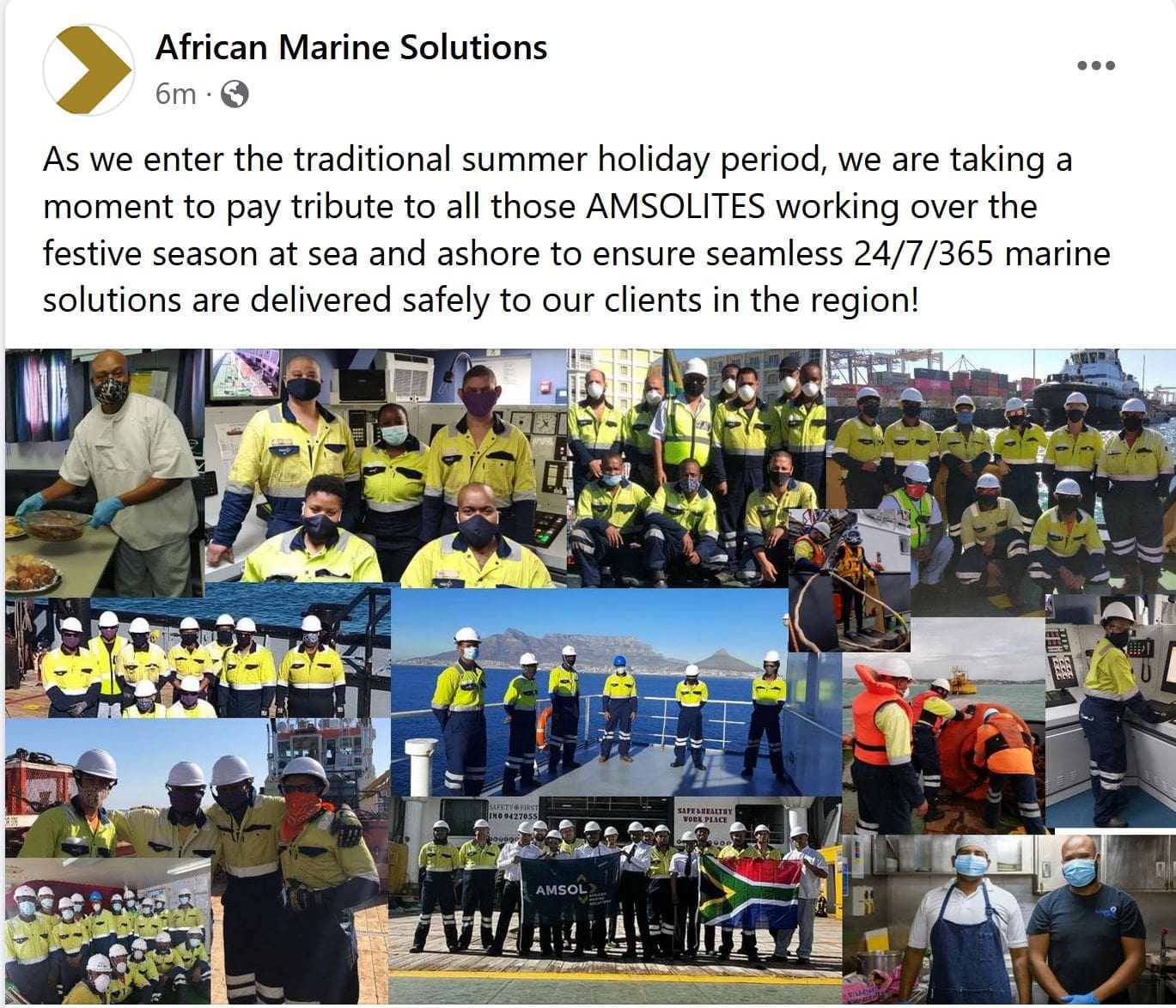
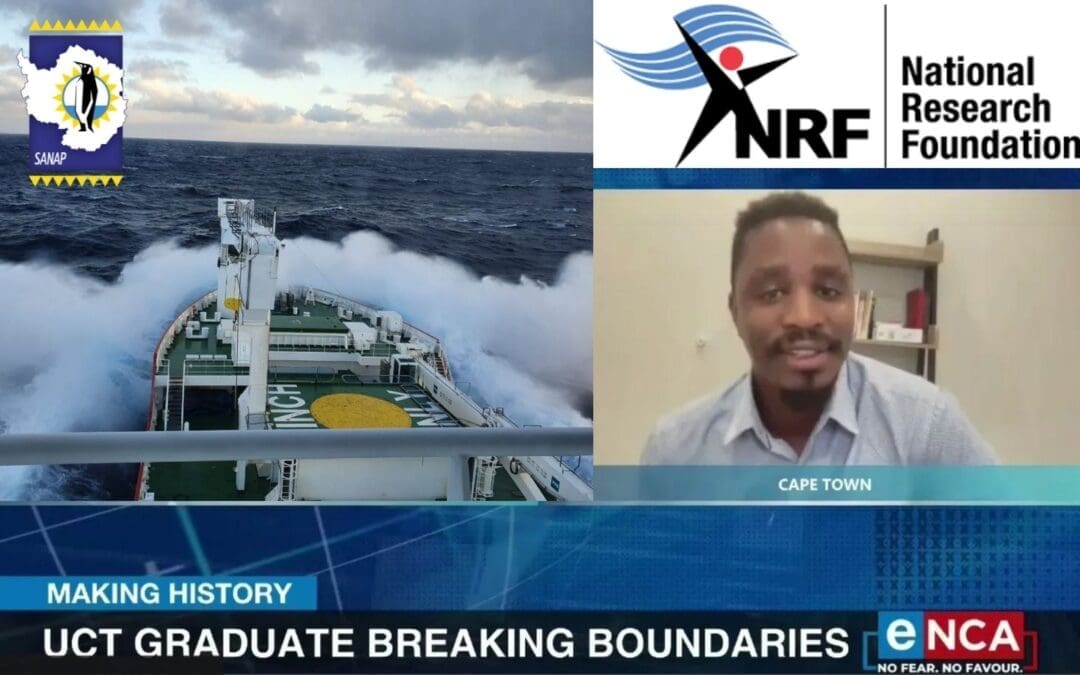
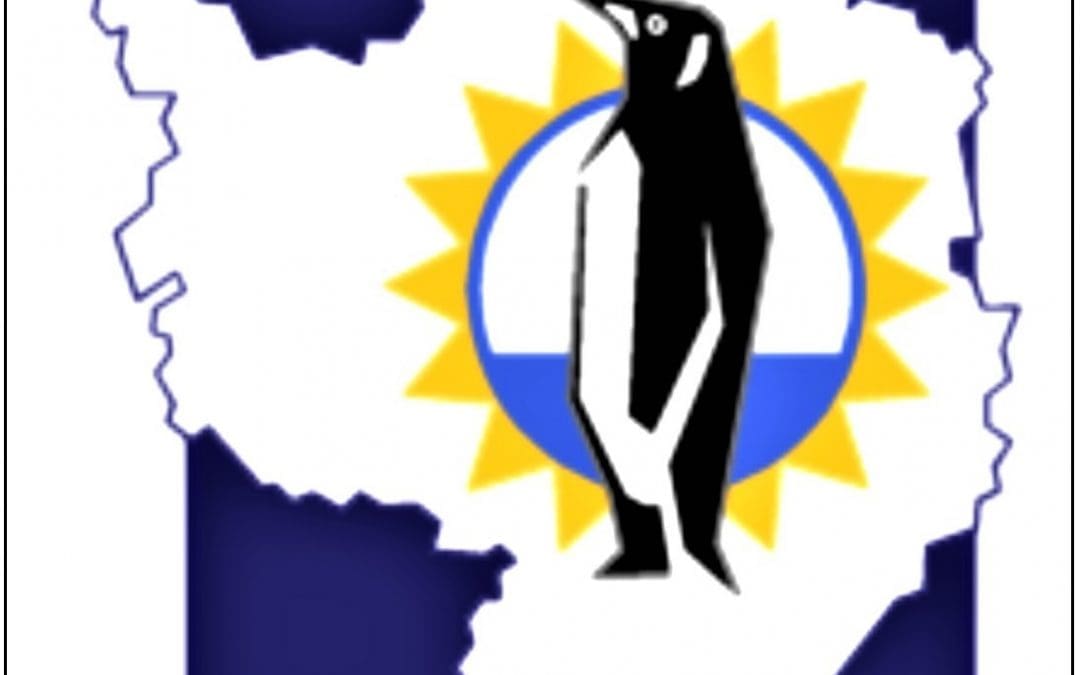
 South African Polar Research Infrastructure (SAPRI): Launch of the Preparatory Phase
South African Polar Research Infrastructure (SAPRI): Launch of the Preparatory Phase
 The SAPRI team is pleased to inform you that the contractual agreement for the starting of the SAPRI implementation phase is being finalized between the
The SAPRI team is pleased to inform you that the contractual agreement for the starting of the SAPRI implementation phase is being finalized between the 
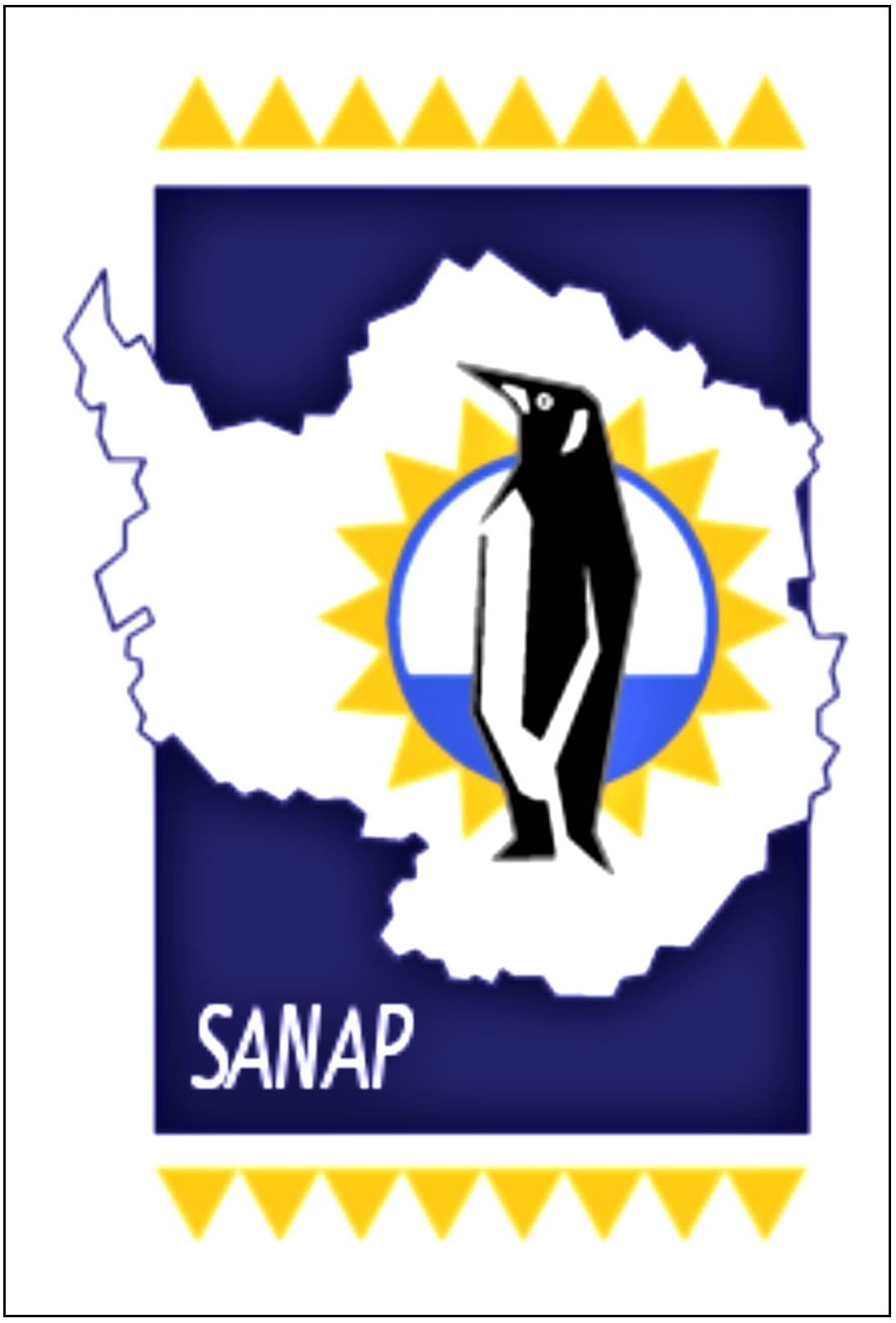 These achievements would not have been possible without the trust demonstrated by the scientific
These achievements would not have been possible without the trust demonstrated by the scientific 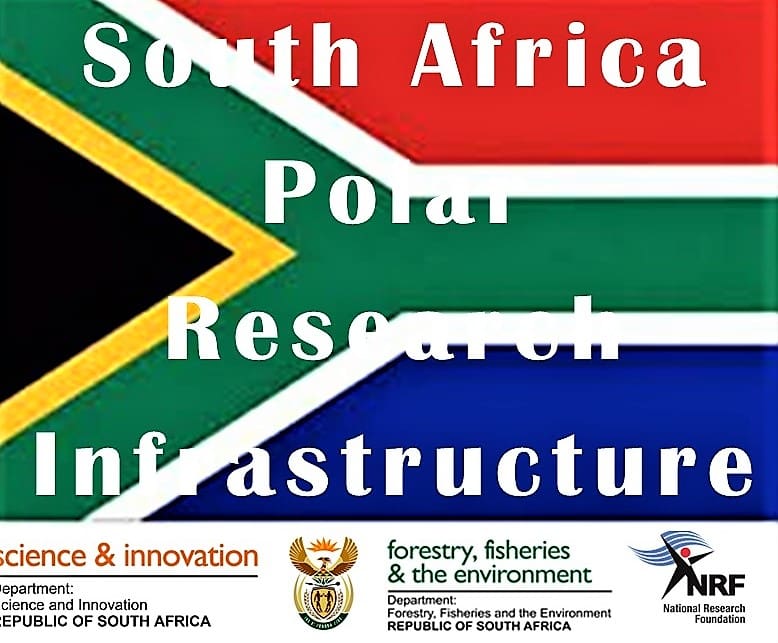 The launch of the SAPRI Preparatory Phase was announced via a webinar and a Q&A session to illustrate the main aspects of SAPRI, its organization into integrated facilities, and the first steps of the implementation phase listed in the business plan. To accelerate the implementation phase, it is proposed to initiate an informal Preparatory Phase of SAPRI and to discuss the following actions with the community of stakeholders:
The launch of the SAPRI Preparatory Phase was announced via a webinar and a Q&A session to illustrate the main aspects of SAPRI, its organization into integrated facilities, and the first steps of the implementation phase listed in the business plan. To accelerate the implementation phase, it is proposed to initiate an informal Preparatory Phase of SAPRI and to discuss the following actions with the community of stakeholders: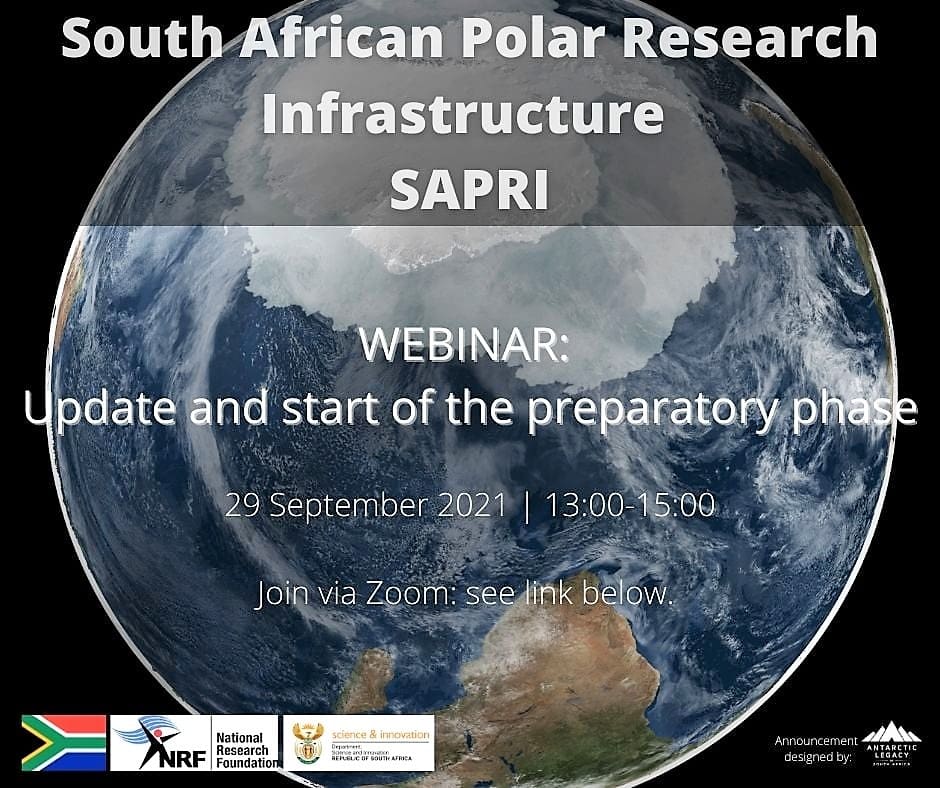 The virtual webinar took place on 29th September 13:00-15:00 and was led by the SAPRI team; Tamaryn Morris, Marcello Vichi, Juliet Hermes, Johannes Pauw.
The virtual webinar took place on 29th September 13:00-15:00 and was led by the SAPRI team; Tamaryn Morris, Marcello Vichi, Juliet Hermes, Johannes Pauw.
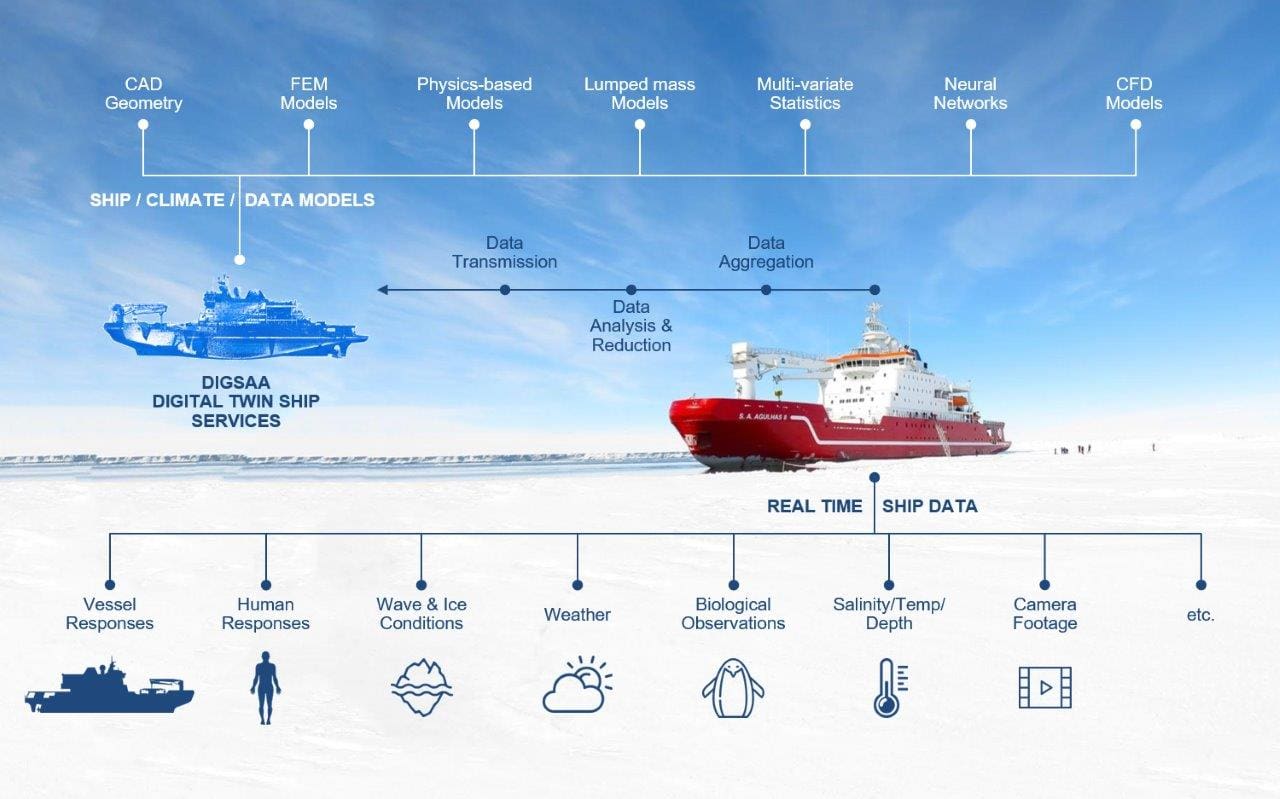 Industry 4.0 is the digital transformation of global industry. Digital twins pose to disrupt conventional business as they harness real-time data alongside a digitized representation of the state and behaviour of real assets to offer decision support. Sound and vibration research often entails multi-sensor measurements, signal processing and analytics providing an ideal training background to embrace the current innovation climate.
Industry 4.0 is the digital transformation of global industry. Digital twins pose to disrupt conventional business as they harness real-time data alongside a digitized representation of the state and behaviour of real assets to offer decision support. Sound and vibration research often entails multi-sensor measurements, signal processing and analytics providing an ideal training background to embrace the current innovation climate. Funding from the South African National Antarctic Programme, has boosted the group’s research to instigate the digital transformation of Africa’s only polar research vessel, the SA Agulhas II, to a “flagship for Vessel 4.0”. The full-scale measurement project – engineering measurements on the ship in operation – kicked off in 2012. SVRG collaborated in an international consortium including the Universities of Aalto and Oulo, Aker Arctic, Det Norske Veritas, Rolls Royce, Wärtsilä and STX Europe. The then, newly commissioned SA Agulhas II was put to the test during two days of ice-breaking operations in the Bay of Bothnia in Finland during ice-trails. Today, the SA Agulhas II is equipped with +200 engineering sensors to measure the ice and waves in the ship’s environment, the bending and twisting of her hull and the wellbeing of passengers.
Funding from the South African National Antarctic Programme, has boosted the group’s research to instigate the digital transformation of Africa’s only polar research vessel, the SA Agulhas II, to a “flagship for Vessel 4.0”. The full-scale measurement project – engineering measurements on the ship in operation – kicked off in 2012. SVRG collaborated in an international consortium including the Universities of Aalto and Oulo, Aker Arctic, Det Norske Veritas, Rolls Royce, Wärtsilä and STX Europe. The then, newly commissioned SA Agulhas II was put to the test during two days of ice-breaking operations in the Bay of Bothnia in Finland during ice-trails. Today, the SA Agulhas II is equipped with +200 engineering sensors to measure the ice and waves in the ship’s environment, the bending and twisting of her hull and the wellbeing of passengers.










 A great sense of pride and honour is instilled in all who sail aboard the SA Agulhas II and is seen as privilege to be part of this legacy of exploration. We thank all administrative staff involved with ensuring safe and efficient operations and celebrate all seafarers, without whom our scientific endeavours in the Southern Ocean would not be possible.
A great sense of pride and honour is instilled in all who sail aboard the SA Agulhas II and is seen as privilege to be part of this legacy of exploration. We thank all administrative staff involved with ensuring safe and efficient operations and celebrate all seafarers, without whom our scientific endeavours in the Southern Ocean would not be possible.







